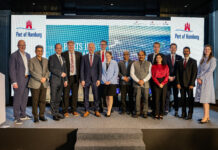
The Port of Riga is set to host the first large-scale production facility in the Baltic region for renewable fuels, including hydrotreated vegetable oil (HVO) and sustainable aviation fuel (SAF).
This initiative, developed in partnership with Ukrainian investors, aims to meet the growing demand for high-value, eco-friendly fuel products in Latvia and across Europe. By advancing climate neutrality and green objectives, the project will enhance Latvia’s export potential and strengthen its energy independence from foreign fuel imports.
On 26 November, Latvia’s Minister for Climate and Energy Kaspars Melnis visited the Port of Riga to review the project led by SIA PARS TERMINALS. During his visit, the minister inspected the proposed site for the facility in Kundziņsala and explored other renewable energy initiatives underway in the port.
“Sustainable thinking, by creating a new, long-term demand renewable fuel production facility in the Freeport of Riga, is an economically forward-looking way to increase Latvia’s influence as a sustainable energy producer in the Baltics in a context of declining transit cargo volumes in the region. The renewable fuel plant will strengthen energy independence, and create 120 highly skilled jobs while providing Latvian farmers with stable demand for energy-intensive crops and helping Latvia to meet its climate neutrality goals,” stated Melnis.
The plant will leverage innovative technologies to produce competitive, environmentally friendly fuel alternatives using various natural vegetable oils as the primary feedstock. This state-of-the-art facility will be the first of its kind in the Baltic region.
With a projected feedstock capacity of approximately 236,000 tonnes annually, the plant will produce 93,000 tonnes of HVO and 87,000 tonnes of SAF. The total investment in the project is estimated at up to US$126 million, with completion expected in 20 months due to the availability of required equipment and technology.
This renewable fuel initiative represents a significant milestone in promoting Latvia’s energy independence and fostering local production based on domestic resources. The project will directly and indirectly support the local economy, enhance the competitiveness of Latvian companies, and address the growing demand for biofuels in various sectors, including aviation. Strengthening economic ties with Ukrainian investors also holds strategic importance for Latvia and Europe amid current geopolitical challenges.
Additional discussions during the minister’s visit highlighted other green energy projects at the Port of Riga. These include plans for wind turbine component production and logistics infrastructure in Kundziņsala, the development of one of the Baltic region’s largest solar panel parks in Spilve Meadows with an annual green electricity output of around 100,000 MWh, and participation in the “BalticSeaH2 – Baltic-Nordic Hydrogen Valley” hydrogen research project.
Progress on initiatives such as shore power connections for ships and modernising the Freeport of Riga Authority’s technical fleet was also discussed, further underscoring the port’s commitment to climate neutrality.




